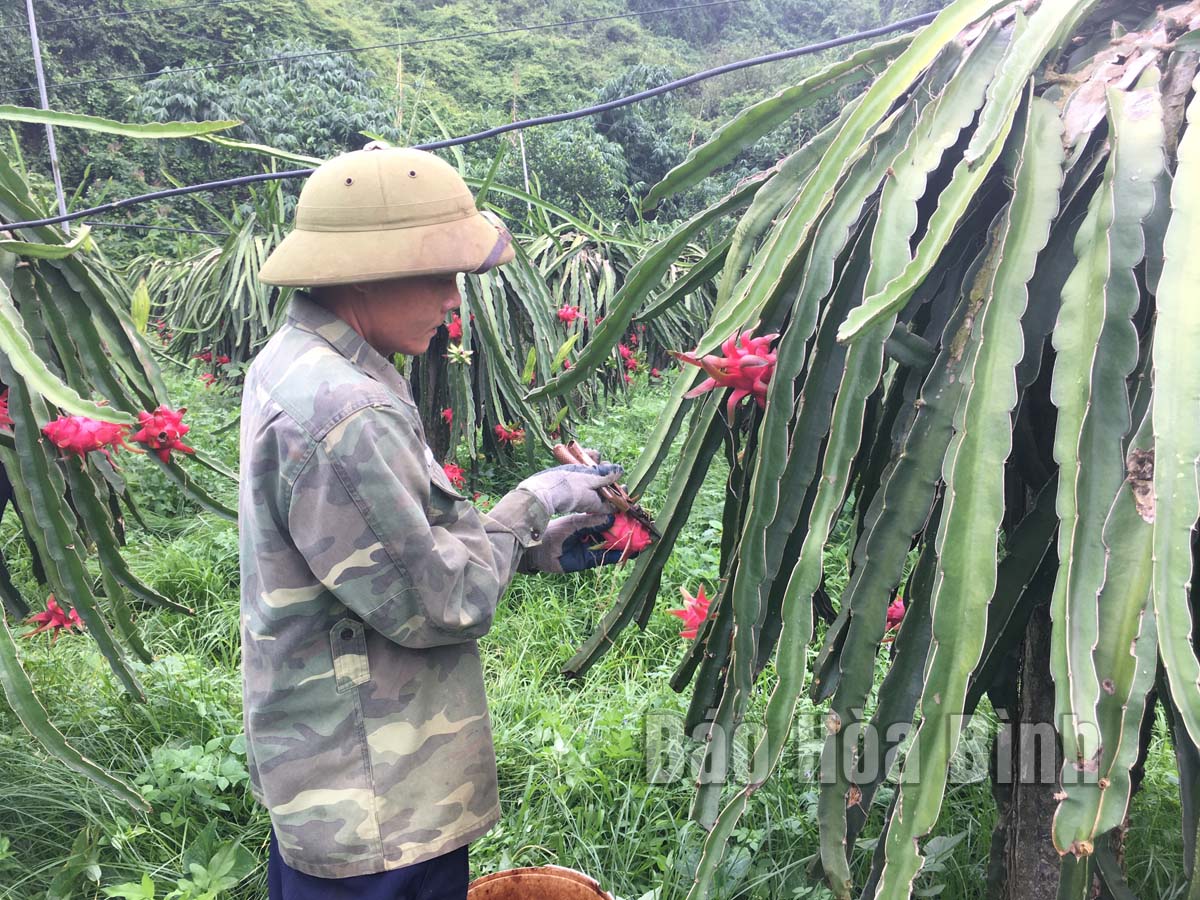
(HBO) – Red-flesh dragon fruit farming has become increasingly popular in Lac Thuy district over the last 10 years. The district now has nearly 56 hectares under the tree, mostly in Ba Hang Doi township and Phu Thanh commune. Productivity is estimated at 18 – 20 tonnes per hectare on average and output reaches 810 – 900 tonnes per year.

A farmer works on his red-flesh dragon fruit farm in Ba Hang Doi township, Lac Thuy.
Red-flesh dragon fruit produced by Thanh Hoa agricultural and service cooperative has been recognised as a three-star "One Commune, One Product” (OCOP) product of the province. It is among the six OCOP products of Lac Thuy made available on e-commerce platforms in an effort to gain broader market access for the district’s farm produce. The district is also planning to expand intensive-farming areas of the fruit.
Ba Hang Doi township alone is home to 26 hectares of red-flesh dragon fruit cultivated by 40 households on T-shaped frames, the latest farming technique, which have not only helped improve productivity but also cut labour costs and generate 4 – 5 crops per year.
However, the farming of the fruit in the district has yet to achieve sustainability as most of the farming areas are on a small scale and the district has not developed a large-scale production zone for the sector. Additionally, seedling quality still varies and application of advanced technology and disease control remain limited.
Head of the district’s division of agriculture and rural development Ngo Dinh Tam said Lac Thuy is seeking a certification for the trademark "Lac Thuy Dragon Fruit” which is expected to finalise this year. It has been raising growers’ awareness of Production Unit Code and Packing House Code, accelerating the granting of the codes, and strengthening the management of the granted codes, he said, adding that these factors are crucial for local dragon fruit to enter foreign markets.
In the long term, the district needs to set sight on dried and juice products from the fruit in order to raise its values, he noted./.
Dao Village’s honey – a product certified with a 3-star OCOP (One Commune One Product) rating by Thong Nhat Agricultural Cooperative in Dao Village (Hoa Binh City) – is highly regarded by consumers for its quality, richness, and variety in packaging. The distinctively sweet taste of Dao Village’s honey leaves a lasting impression on anyone who has tried it.
In alignment with Project No. 07-DA/TU, issued by the Hoa Binh provincial Party Committee on November 1, 2021, Lac Thuy district has actively promoted investment and supported the sustainable development of its industrial and handicraft sectors during the 2021–2025 period. Alongside this, the district has remained committed to preserving and revitalising traditional craft villages.
Located in the northern part of Lac Thuy district, with a temperate climate and fertile soil, Phu Thanh commune has great potential and advantages in growing tea. The long-standing experience, combined with strict adherence to organic farming practices in the tea gardens, ensures that the dried tea products from Phu Thanh and Lac Thuy as a whole are sold out immediately upon production, providing a stable and prosperous life for the local people.
Amid efforts to streamline the administrative apparatus, Hoa Binh province has intensified measures to address challenges in land clearance, resettlement support, and infrastructure investment, aiming to speed up the progress of key projects.
Hoa Binh province has posted an unprecedented economic growth rate of 12.76% in the first quarter of 2025, marking its highest quarterly performance to date and positioning it as the second fastest-growing locality in the country, trailing only Bac Giang province.
Under current regulations, products in the One Commune – One Product (OCOP) programme that are rated three stars or higher must undergo re-evaluation every three months. However, in reality, some of these products fail to consistently meet the required standards, raising concerns about the sustainability of their OCOP certification. This underscores the urgent need for producers to enhance product quality and gradually develop their OCOP products into strong, marketable brands.



